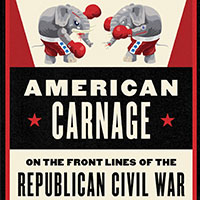— Book review by Jens Kruse —

Journalism has been called “the first rough draft of history” and Tim Alberta’s book gives us the history of the ten years from February of 2008 to December of 2018, the history of, as the subtitle of his book states, the “Republican Civil War and the Rise of President Trump.” He explains that “[t]he narrative I am setting forth in these pages” – all 612 of them – “is not meant to be comprehensive. What I have attempted to construct is an account guided by my own coverage of what, until the spring of 2016, was commonly known as the Republican civil war, as told through the eyes of the combatants on the front lines (ix).”
And Tim Alberta knows the combatants well and has reported on the issues at the center of their skirmishes and their battles for many years. He is currently the chief political correspondent for Politico Magazine, but prior to that he reported for the National Review and the Wall Street Journal, among others. In other words, he has covered the events and the actors of this decade of the history of the Republican Party, and, consequently, of the history of our body politic, not so much as a distant observer but as someone who has for many years been at the center of the storm.
His account may not be “comprehensive,” but it is hard to imagine a more broadly and deeply sourced and reported – and hence detailed and rich — account of these ten years. Alberta says that his “book is fashioned not as a traditional work of journalism, but as a storytelling narrative (ix).”
And what a storyteller Tim Alberta is! If a reader opening this book might be concerned that 600+ pages of narrative might not just be exhaustive, but also exhausting, s/he will soon be pleasantly surprised that Alberta tells the story briskly and muscularly, carrying the reader forward expertly. My interest in his account never flagged, and 600 pages never seemed long.
At the end of his “Author’s Note” Alberta writes:
It is my hope that by reading this account of the political and cultural turbulence that rattled the nation during the first two decades of the twenty-first century, you will gain a more textured understanding of Donald Trump’s rise to the presidency – and of its implications for America. (x)
The “Prologue” of American Carnage paints the scene of Alberta sitting in front of the Resolute Desk with Trump behind it; in the “Epilogue,” after reviewing what Trump has done to the Republican Party and to Democratic presidential candidates, Alberta returns to that scene, asking the President whether he is “transitional or transformational.” After a brief pretense of coyness Trump answers: “Honestly, can there even be a question” (612)?
In between, Alberta takes us from the beginning of the 2008 presidential election season to the Democrat’s retaking of the House in 2018 and the subsequent Trump shutdown of the federal government.
If you have forgotten the myriad events that stressed and strained our politics and our society during that decade American Carnage will remind you of them: comprehensively, in vivid detail, and with relentless and compelling narrative analysis that does, perhaps more than any other book I have read recently, answer granularly the question with which Alberta opens his book: “How did Donald Trump become president of the United States” (vii)?
There, at the beginning, Alberta gives the answer that he will then exfoliate in all that follows:
Since the early morning hours of November 9, 2016, game attempts to solve this riddle have been subject to the same disorienting forces that came to define his political ascent: ideological bias and tribal loyalty, social alienation and demographic transition, institutional breakdown and political polarization.
There is a temptation not only to associate these things with Trump but, but to blame him for the havoc they hath [sic] wrought on America and the world. Throughout his campaign for the presidency and his first two years in office, Trump defied every law of gravity while shattering societal conventions that will prove difficult to repair. In so doing, he nurtured narratives of his own centrality to a bruising reconfiguration of American life.
Trailblazing as he might be, Trump is not the creator of this era of national disruption. Rather, he is its most manifest consequence. (vi)
American Carnage. On the Frontlines of the Republican Civil War and the Rise of President Trump (New York: Harper, 2019) can be checked out from the Orcas Library. It is available through Darvill’s Bookstore.
**If you are reading theOrcasonian for free, thank your fellow islanders. If you would like to support theOrcasonian CLICK HERE to set your modestly-priced, voluntary subscription. Otherwise, no worries; we’re happy to share with you.**









Brilliant review, Jens. Thanks for your insights.
“Trump is not the creator of this era of national disruption. Rather, he is its most manifest consequence.” Yes, thank you Jen. I will purchase this book. I’ve recently been reading Howard Zinn’s, “The People’s History of the United States.” This should be required reading in all schools. The reality is that the seeds of fear & discontent amongst the people, and the evil that controlled it were sowed by our founding fathers during the earliest stages of our country’s inception… and continue to this day. The phrase, “What we don’t know will kill us” comes to mind.
Thanks, David and Michael. I agree with you about Howard Zinn. Stay tuned for my next review, of *If We Can Keep It*.
The current president may be the most manifest consequence of the national disruption, but he is doing nothing to ameliorate it. If anything, he is doing everything he can to exacerbate it. I fear for the republic, which seems headed for crisis.
Thanks Jens.
As this book still costs ~$20 even used, I can’t comment on content. I like that Alberta attempts a 20yr recon of relevant history. Though I feel a longer view is needed, both backwards and forwards. By ALL!
I wish someone would take the list of !!!!’s and simply put them in the appropriate context. Increasingly we are standing back and outwaiting Mr.T instead of reacting.. taking legal and social action to resolve the inflamed margins he so skillfully exploits.
I’m not so sure that Mr.Alberta greatly improves our resistance to Mr.T’s finding of yet another crowded theater to shout ‘Fire!’ into. But I have not read the book. It is not sustainable governance to create policy with a tweet, or rely on agency temps to lead thoughtfully. But this is a lesson we apparently need to learn, let us hope we only need four years to graduate with a new appreciation of our founding. It will only require a majority of the of 25% black and hispanic American voters to turn out to defeat him in the polls. Patience, patience. Then stick the fork in..